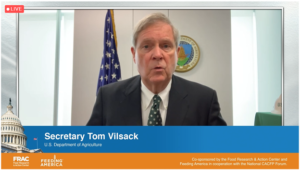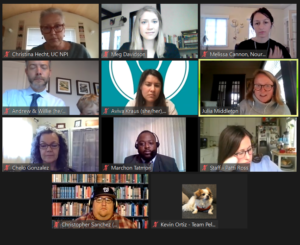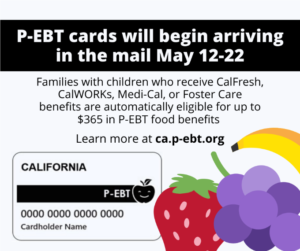Ending hunger starts with policy change, and policy change starts at the ballot box. To encourage civic engagement around the issue of hunger in the City and County of San Francisco, the Food Bank partnered with the League of Women Voters and UCSF in co-sponsoring a San Francisco Mayor Candidate Forum on Sept. 30, 2024, at 6 p.m. at UCSF’s Robertson Auditorium. That same evening, 20 community members came together for a live stream of the event at a Mayoral Forum Watch Party in the Food Bank’s Welcome Center.
In alignment with the Food Bank’s co-sponsorship of the forum, mayoral candidates were asked how they would address food insecurity. Watch party attendee Troy Burnette, a member of the Food Bank’s new grassroots advocacy program, the Food Policy Advocacy Coalition (Food PAC) appreciated the opportunity to gather with others to discuss the candidates’ positions. “We all need to be coming together to get a better understanding of what we need to work on, to hopefully make things better for everybody,” said Troy. “To hear the candidates speak from their own voices makes a difference on who you may lean toward to move forward and hopefully help the Food Bank.”
Andre Aikens, Director of Programs for the Rafiki Coalition (a Food Bank partner), also noted that the location of the watch party helped underscore the reality of hunger with the policy positions on food insecurity shared by the candidates. “It connects the dots,” Andre said. “Listening to the candidates and sitting in this place kind of brings it all together so that you feel whether or not an individual actually has a plan, and this issue [hunger] is a priority as well.”
The candidate forum and watch party are part of ongoing strategic efforts to increase awareness of the Food Bank’s public policy concerns and foster civic engagement activities around ending hunger, according to Noriko Lim-Tepper, Chief Officer for the Food Bank’s Strategic Partnerships, Advocacy and Voice (SPAV) Department. “The Food Bank values the strength and wisdom in our community. As an organization, we center our efforts on lifting the voices of people who have lived experiences with food insecurity to lead meaningful policy change,” said Noriko.
In addition to viewing the live stream, attendees posed questions to members of the SPAV team. Discussion topics included how ranked choice voting works, aspects of the mayoral race and updates on the Food Bank’s latest policy and advocacy efforts including helping to drive statewide efforts to pass AB518, a new law that could lead to greater access to CalFresh for many eligible but unenrolled Californians.
Over the next several months SPAV plans additional events demonstrating the Food Bank as a civic engagement gathering place. The department includes the Community Building team of Associate Director Irene Garcia, and Community Builder Jesus Benitez Gomez, and Policy & Advocacy’s Associate Director Marchon Tatmon, and Community Organizer Alex Raffanti. Learn more about Food Bank advocacy efforts at sfmfoodbank.org/advocacy.



 The new remote format makes it easier for advocates who were previously unable to participate in the vital activity of meeting directly with our elected leaders because of the challenge of paying for travel to D.C. Our Policy & Advocacy team arranged meetings with our Members of Congress and fellow community-based organizations from our district to share the local impact of Federal policies and request their support for policies and funding to alleviate hunger across their district.
The new remote format makes it easier for advocates who were previously unable to participate in the vital activity of meeting directly with our elected leaders because of the challenge of paying for travel to D.C. Our Policy & Advocacy team arranged meetings with our Members of Congress and fellow community-based organizations from our district to share the local impact of Federal policies and request their support for policies and funding to alleviate hunger across their district.

Share